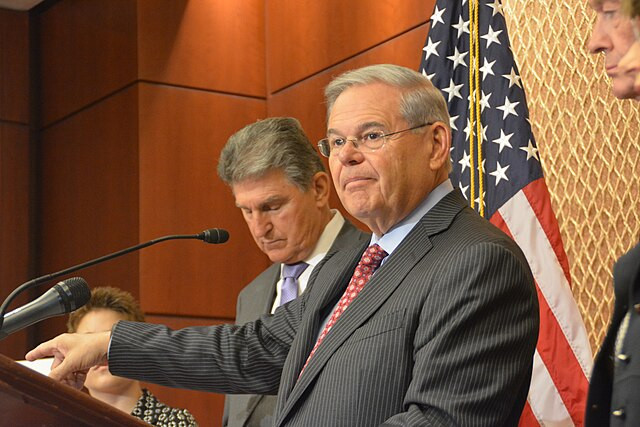Sen. Bob Menendez was found guilty on all counts in his federal corruption trial on Tuesday. The New Jersey Democrat faced accusations of accepting hundreds of thousands of dollars in bribes, including cash, gold bars, mortgage payments, and more, in exchange for using his political influence. The allegations extended to Menendez acting as a foreign agent for the governments of Egypt and Qatar. Two New Jersey businessmen, Wael Hana and Fred Daibes, were also convicted on all charges they faced.
Menendez, who pleaded not guilty to 16 federal charges including bribery, fraud, and obstruction, expressed his disappointment outside the courthouse. "I have never violated my oath," he stated. "I have never been anything but a patriot of my country and for my country. I have never, ever been a foreign agent." Menendez announced his intention to appeal the conviction and emphasized that the jury's decision jeopardizes the integrity of every U.S. senator by setting a dangerous precedent.
Despite his conviction, Menendez is not required to resign from his Senate seat, although he could be expelled. Senate Majority Leader Chuck Schumer called for his resignation immediately after the verdict. "In light of this guilty verdict, Senator Menendez must now do what is right for his constituents, the Senate, and our country, and resign," Schumer stated. Sen. Cory Booker and New Jersey Governor Phil Murphy echoed this sentiment, with Murphy threatening to call for Menendez's expulsion if he does not resign voluntarily.
The case against Menendez, prosecuted by U.S. Attorney Damian Williams, revolved around what Williams described as "shocking levels of corruption." According to the prosecution, Menendez used his position to accumulate wealth through bribes in the form of gold, cash, and a Mercedes-Benz. Federal prosecutor Paul Monteleoni described Menendez's actions as politics driven by personal profit, stating, "Robert Menendez wanted all that power and he also wanted to use it to pile up riches for himself and his wife."
The defense team, led by attorney Adam Fee, argued that Menendez's actions were lawful and fell within the scope of his duties. Fee derided the prosecution's case as "cherry-picked nonsense" and insisted that Menendez's actions were beneficial for the country. Despite these arguments, the jury found Menendez guilty after three days of deliberations. Menendez chose not to testify in his defense, stating that the government had failed to prove their case against him.
Menendez faces sentencing on October 29 and could potentially spend decades in prison. The Senate Ethics Committee has announced plans to complete its investigation into Menendez's conduct and consider disciplinary actions, including expulsion and censure. This conviction marks the second time Menendez has faced federal corruption charges; a 2015 indictment ended in a mistrial in 2018 after a jury failed to reach a verdict.
Prosecutors presented evidence showing that Menendez promised to use his influence to benefit the Egyptian government, brokered by Wael Hana. Additionally, Menendez was accused of interfering with a New Jersey Attorney General's investigation in exchange for a $60,000 Mercedes-Benz convertible. Text messages between Menendez and his wife, Nadine, indicated their knowledge of the illicit transactions. The FBI found gold bars and over $400,000 in cash stashed in various places in Menendez's home.
Wael Hana and Fred Daibes pleaded not guilty and will face further legal proceedings. Jose Uribe, another businessman involved, pleaded guilty and testified against Menendez and his co-defendants. Nadine Menendez, who is battling Grade 3 breast cancer, will be tried separately in August. The complex web of relationships and transactions detailed in the trial painted a picture of a senator deeply entangled in corrupt practices.
Menendez's conviction raises significant questions about his political future. While he filed a petition to run for the U.S. Senate as an independent candidate, his ability to mount a successful campaign is now in serious doubt. His resignation or expulsion could pave the way for a special election in New Jersey, potentially reshaping the state's political landscape. As the political fallout continues, the case underscores the broader issues of corruption and accountability within the U.S. political system.
The Menendez case has far-reaching implications for U.S. politics, highlighting the persistent issue of corruption among elected officials. It serves as a reminder of the need for rigorous oversight and accountability to maintain public trust in government institutions. As Menendez's legal battles continue, the case will likely prompt further scrutiny of political practices and the ethical standards expected of public servants.






